- Clone
- 89B3A5 (See other available formats)
- Regulatory Status
- RUO
- Other Names
- Vascular endothelial growth factor receptor 2, VEGFR2, KDR, protein tyrosine kinase receptor flk-1, fetal liver kinase-1
- Isotype
- Rat IgG2a, κ
- Ave. Rating
- Submit a Review
- Product Citations
- publications
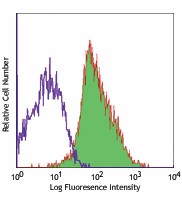
-

Mouse FLK-1 transfected cells stained with 89B3A5 Alexa Fluor® 647
| Cat # | Size | Price | Save |
|---|---|---|---|
| 121909 | 25 µg | ¥27,280 | |
| 121910 | 100 µg | ¥58,300 |
The 89B3A5 antibody recognizes mouse CD309 also known as vascular endothelial growth factor receptor 2, VEGFR2, KDR, protein tyrosine kinase receptor flk-1, and fetal liver kinase-1. Flk-1 is a member of the tyrosine protein kinase family, sub-family CSF-1/PDGF, that contains a single pass transmembrane receptor with a protein kinase domain and seven immunoglobulin-like domains in the extracellular region. Flk-1 is expressed at high levels in adult heart, lung, kidney, brain, and skeletal muscle; other tissues express at lower levels. Flk-1 is a receptor for VEGF or VEGFC; ligand binding plays a key role in vascular development and vascular permeability. The 89B3A5 antibody has been shown to be useful for flow cytometry.
Product DetailsProduct Details
- Verified Reactivity
- Mouse
- Antibody Type
- Monoclonal
- Host Species
- Rat
- Immunogen
- Rat-1 cells transfected with full-length mouse Flk
- Formulation
- Phosphate-buffered solution, pH 7.2, containing 0.09% sodium azide.
- Preparation
- The antibody was purified by affinity chromatography and conjugated with Alexa Fluor® 647 under optimal conditions.
- Concentration
- 0.5 mg/ml
- Storage & Handling
- The antibody solution should be stored undiluted between 2°C and 8°C, and protected from prolonged exposure to light. Do not freeze.
- Application
-
FC - Quality tested
- Recommended Usage
-
Each lot of this antibody is quality control tested by immunofluorescent staining with flow cytometric analysis. For flow cytometric staining, the suggested use of this reagent is ≤0.25 µg per million cells in 100 µl volume. It is recommended that the reagent be titrated for optimal performance for each application.
* Alexa Fluor® 647 has a maximum emission of 668 nm when it is excited at 633 nm / 635 nm.
Alexa Fluor® and Pacific Blue™ are trademarks of Life Technologies Corporation.
View full statement regarding label licenses - Excitation Laser
-
Red Laser (633 nm)
-
Application References
(PubMed link indicates BioLegend citation) -
- Kaburn N, et al. 1997. Development 124:2039.
- Product Citations
-
- RRID
-
AB_756169 (BioLegend Cat. No. 121909)
AB_756169 (BioLegend Cat. No. 121910)
Antigen Details
- Structure
- Member of the tyrosine protein kinase family, sub-family CSF-1/PDGF. Single pass transmembrane receptor containing a protein kinase domain and seven immunoglobulin-like domains.
- Distribution
-
Expressed at high levels in adult heart, lung, kidney, brain, and skeletal muscle; other tissues express at lower levels.
- Function
- Receptor for VEGF or VEGFC. Ligand binding plays a key role in vascular development and vascular permeability.
- Ligand/Receptor
- VEGF, VEGFC
- Biology Area
- Angiogenesis, Cell Biology, Immunology
- Molecular Family
- CD Molecules, Cytokine/Chemokine Receptors
- Antigen References
-
1. Patterson C, et al. 1995. J. Biol. Chem. 270:23111.
2. Quinn TP, et al. 1993. Proc. Natl. Acad. Sci. USA 90:7533. - Gene ID
- 16542 View all products for this Gene ID
- UniProt
- View information about CD309 on UniProt.org
Related FAQs
Other Formats
View All CD309 Reagents Request Custom Conjugation| Description | Clone | Applications |
|---|---|---|
| Purified anti-mouse CD309 (VEGFR2, Flk-1) | 89B3A5 | FC |
| Biotin anti-mouse CD309 (VEGFR2, Flk-1) | 89B3A5 | FC |
| PE anti-mouse CD309 (VEGFR2, Flk-1) | 89B3A5 | FC |
| Alexa Fluor® 488 anti-mouse CD309 (VEGFR2, Flk-1) | 89B3A5 | FC |
| Alexa Fluor® 647 anti-mouse CD309 (VEGFR2, Flk-1) | 89B3A5 | FC |
| Pacific Blue™ anti-mouse CD309 (VEGFR2, Flk-1) | 89B3A5 | FC |
| PerCP/Cyanine5.5 anti-mouse CD309 (VEGFR2, Flk-1) | 89B3A5 | FC |
| Spark Red™ 718 anti-mouse CD309 (VEGFR2, Flk-1) (Flexi-Fluor™) | 89B3A5 | FC |
| Spark Blue™ 574 anti-mouse CD309 (VEGFR2, Flk-1) (Flexi-Fluor™) | 89B3A5 | FC |
| Spark Blue™ 550 anti-mouse CD309 (VEGFR2, Flk-1) (Flexi-Fluor™) | 89B3A5 | FC |
Customers Also Purchased
Compare Data Across All Formats
This data display is provided for general comparisons between formats.
Your actual data may vary due to variations in samples, target cells, instruments and their settings, staining conditions, and other factors.
If you need assistance with selecting the best format contact our expert technical support team.
-
Purified anti-mouse CD309 (VEGFR2, Flk-1)
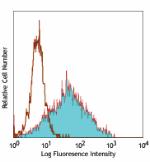
Mouse FLK-1 transfected cells stained with purified 89B3A5, ... -
Biotin anti-mouse CD309 (VEGFR2, Flk-1)
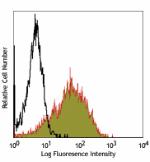
Mouse FLK-1 transfected cells stained with biotinylated 89B3... -
PE anti-mouse CD309 (VEGFR2, Flk-1)
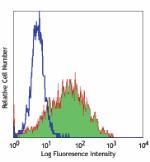
Mouse FLK-1 transfected cells stained with 89B3A5 PE -
Alexa Fluor® 488 anti-mouse CD309 (VEGFR2, Flk-1)
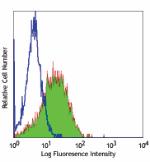
Mouse FLK-1 transfected cells stained with 89B3A5 Alexa Fluo... -
Alexa Fluor® 647 anti-mouse CD309 (VEGFR2, Flk-1)
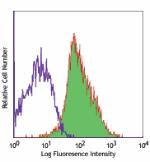
Mouse FLK-1 transfected cells stained with 89B3A5 Alexa Fluo... -
Pacific Blue™ anti-mouse CD309 (VEGFR2, Flk-1)
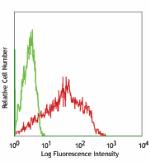
Mouse FLK-1 transfected cells stained with 89B3A5 Pacific Bl... -
PerCP/Cyanine5.5 anti-mouse CD309 (VEGFR2, Flk-1)
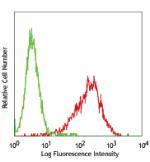
FLK-1 transfected cells stained with 89B3A5 PerCP/Cyanine5.5 -
Spark Red™ 718 anti-mouse CD309 (VEGFR2, Flk-1) (Flexi-Fluor™)
-
Spark Blue™ 574 anti-mouse CD309 (VEGFR2, Flk-1) (Flexi-Fluor™)
-
Spark Blue™ 550 anti-mouse CD309 (VEGFR2, Flk-1) (Flexi-Fluor™)











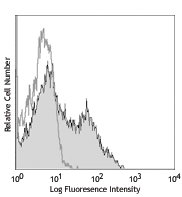
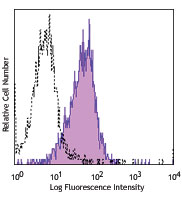
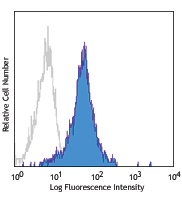
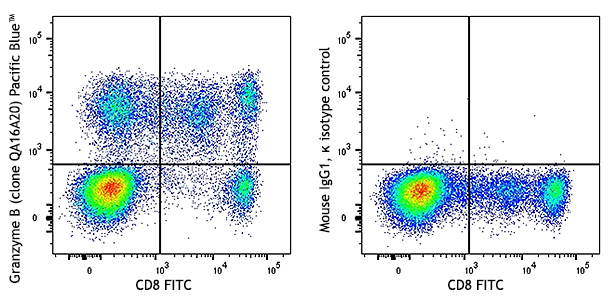



Follow Us